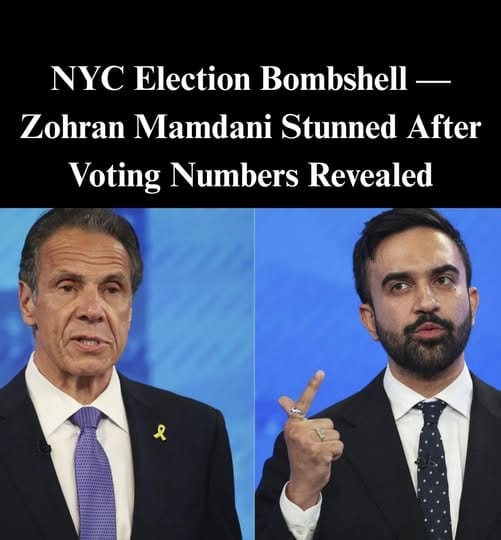With just over a week remaining before Election Day, New York City’s mayoral race has taken a dramatic turn. What once looked like a decisive victory for Democratic Socialist candidate Zohran Mamdani has tightened into a fierce contest, as new polling data suggests the political winds may be shifting in former Governor Andrew Cuomo’s favor.
A new Quinnipiac University poll released on Monday shows Mamdani’s lead over Cuomo has narrowed from 20 points in September to just 10 points now. According to the survey, Mamdani holds 44% of likely voters, while Cuomo, running as an independent, has surged to 34%. Republican candidate Curtis Sliwa trails with 11%, and 7% of voters remain undecided.
The numbers point to growing momentum for Cuomo in the final stretch of one of the most closely watched local elections in the nation. Analysts credit the shift to a combination of strategic endorsements, a disciplined messaging campaign, and Mamdani’s increasingly polarizing platform.
Cuomo’s resurgence has stunned even seasoned political observers. Once seen as a relic of New York’s political past, Cuomo resigned as governor in 2021 amid scandal and public backlash. But in the years since, he has worked to reinvent himself — not as a traditional Democrat, but as an independent voice for pragmatic governance. His campaign slogan, “Experience Over Ideology,” has struck a chord with moderate Democrats, independents, and older voters wary of the city’s progressive turn.
A major turning point came earlier this month when Mayor Eric Adams, who had suspended his own campaign but remains on the ballot, endorsed Cuomo. The endorsement added legitimacy to Cuomo’s bid and helped rally working-class and centrist voters, particularly in Brooklyn, Queens, and Staten Island. Adams praised Cuomo as the candidate “best equipped to tackle crime, affordability, and the dysfunction driving families out of New York.”
That endorsement appears to have reinvigorated Cuomo’s campaign operations. His rallies, once sparsely attended, have drawn larger crowds, and his fundraising numbers have spiked. His message — that Mamdani’s policies are too radical and economically dangerous — has gained traction among voters anxious about rising crime, high rents, and the city’s post-pandemic recovery.
Cuomo has targeted Mamdani’s proposals directly, warning they could “turn New York into a test case for utopian socialism.” Mamdani’s platform calls for expanded rent control, a wealth tax on luxury property owners, and major cuts to NYPD funding in favor of social programs — ideas that have excited the activist left but alienated moderates.
Mamdani, a 34-year-old state assemblyman from Queens and a prominent voice in New York’s progressive movement, continues to defend his proposals as necessary for creating a fairer city. His campaign emphasizes affordable housing, tenant rights, and equitable economic growth. Yet the final weeks have tested his ability to counter a wave of attacks labeling him “too extreme” and “too inexperienced.”
Cuomo’s campaign has leaned heavily into that narrative. In televised debates, he accused Mamdani of being “a Twitter activist pretending to be a mayor,” questioning his grasp of the city’s complex governance challenges. Mamdani, for his part, has fought back by reminding voters of Cuomo’s controversial past — including allegations of corruption, workplace misconduct, and the circumstances that led to his 2021 resignation.
Still, the election’s final phase seems to be defined less by ideology and more by identity and tone. If elected, Mamdani would become New York City’s first Muslim mayor and one of the youngest in its history. For supporters, his rise symbolizes a generational shift in city politics; for critics, it raises concerns about readiness and experience.
As the campaign enters its final days, the question confronting New Yorkers is no longer just about left versus right — it’s about trust, stability, and the future direction of America’s largest city. With undecided voters still up for grabs and early voting underway, both candidates are making their closing arguments.
For Mamdani, it’s a plea to stay the course and embrace change. For Cuomo, it’s a final bid to reclaim relevance — and perhaps redemption.
One thing is certain: when the polls close next week, the outcome will mark a defining moment for New York’s political identity — a city caught between its progressive ideals and its yearning for steadier hands at the helm.
